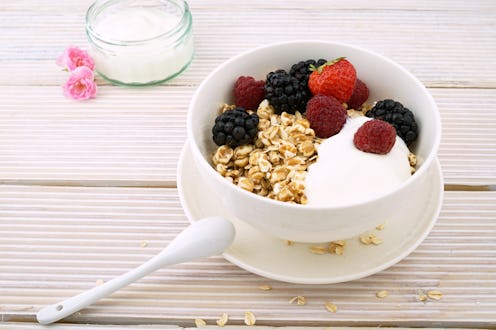Life
9 Foods That Are Natural Laxatives

Going to the bathroom is something that should be pretty regular, but sometimes, we find ourselves backed up. It can be quite uncomfortable feeling unable to go to the bathroom, and when this happens, it can be useful to know what foods are natural laxatives. You might be tempted to buy some laxatives from the drugstore or some special teas, but why not go the natural route instead and help get things moving with some foods you can just incorporate into your diet?
“To help ease discomfort, people tend to reach for the easy fix and purchase laxatives, made of tablet and liquid agents, as well as fiber supplements, but it is important to try and implement a healthier lifestyle in a natural way before resorting to over-the-counter laxatives,” says Brooke Alpert, M.S., R.D., C.D.N. over email. “While supplements you find in drug stores may work for your system, the long term effects can be dangerous to your digestive tract.”
If you rely on laxatives, your body can become dependent on them, says Alpert, and it can also cause other issues such as dehydration and electrolyte imbalance. To avoid these problems, you can try to use food to help improve your digestion. Here are nine foods that are natural laxatives and will help you go to the bathroom when you need to.
1Chia Seeds
"Chia seeds are a favorite source of fiber of mine, and with 10 grams per ounce, they help to add bulk to your gut," says Alpert. When chia seeds absorb water, they form a gel-like consistency, which can help make your stool more moist and easy to pass, according to Very Well.
2Leafy Greens
"Leafy greens are another great source of fiber and easy to include your diet," says Alpert. "A bonus is that they also contain magnesium, so that fiber and mineral combination is really helpful with constipation."
3Aloe Vera
Not only is aloe vera useful for treating sunburns, but it can also help with constipation as well. Studies show that aloe vera has a laxative effect compared to a placebo, helping with bowel movement frequency, consistency of stools, and laxative dependence.
4Papaya
"Papaya is a great alternative to store-bought laxatives," says Alpert. "Not only is the fruit high in water content which helps to keep your system flowing, but it also has an enzyme called papain that helps with digesting proteins in your gut."
5Prunes
"Prunes shouldn’t be a surprise here at all, but with the high amounts of insoluble fiber they contain, they are an old time favorite for avoiding a laxative," says Alpert. Prunes also contain a sugar alcohol called sorbitol, which draws water into the gastrointestinal tract, helping to promote bowel movements, according the journal Critical Reviews in Food Science and Nutrition.
6Flax Seeds
Flax seeds contain mucilage, a slimy, gum-like compound that can help soothe and coat the digestive tract, according to Dr. David Williams. This can provide bulk and softness to the stool, making going to the bathroom easier.
7Probiotic-Rich Foods
A review published in the American Journal of Clinical Nutrition found that , probiotics help increase number of weekly bowel movements and help soften stools, making them easier to pass. Probiotic-rich foods include, yogurt, kimchi, sauerkraut, tempeh, and more.
8Whole Grains
Since fiber is important to help with constipation, whole grain foods can help move things along, as they're high in fiber. One study from the European Journal of Clinical Nutrition found that participants who ate whole-grain rye bread experienced less constipation and more frequent bowel movements than the participants who did not consume the bread.
9Water
"Water is actually the first thing I’d recommend over anything else," says Alpert. "So often our system gets backed up because we’re dehydrated. Without that fluid in your digestive tract, things start to move slower and slower until you’re literally backed up."